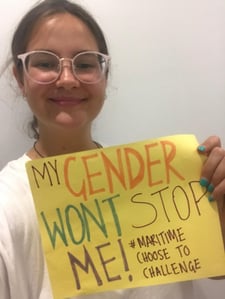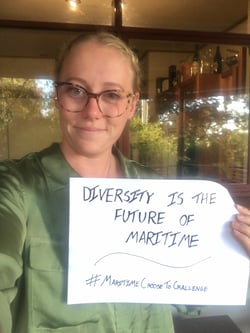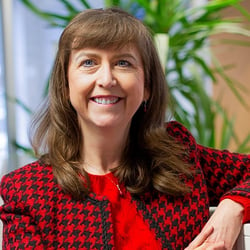4 min read
International Women’s Day 2021 #ChooseToChallenge
By: Belle Davenport on March 8, 2021 at 8:15 AM
.png)
A challenged world is an alert world. Individually, we're all responsible for our own thoughts and actions - all day, every day.
We can all choose to challenge and call out gender bias and inequality. We can all choose to seek out and celebrate women's achievements. Collectively, we can all help create an inclusive world.
From challenge comes change, so let's all choose to challenge.
.png?width=780&name=%23MaritimeChooseToChallenge%20(1).png)
In this guest blog, Dryad's Belle Davenport, shares how her preconceptions about the maritime industry have changed and why it's still imperative for the shipping industry to #ChooseToChallenge inequality.

Maritime Security was never an industry that I considered joining.
On the surface the term Maritime Security seems very specific, only concerning protecting ships and their cargo. It was only when I came across the advertisement for my current role that I delved deeper into the industry. And once I did, I started to understand how geopolitics, humanitarian concerns, international security – and yes protecting ships, are intertwined within our industry, and how every day and situation is different, dynamic, complex and fascinating. And as a young person, having the opportunity to enter such an exciting industry is a brilliant chance to not only learn about the industry, but to discover what we have to offer the industry and what the industry has to offer us over the course of our careers.
But that the fact is, I was quite nervous about starting my new role. Why? Because the Maritime space is well known for being very male dominated – and for some women, working in the Maritime space comes with systemic discrimination, intimidation and harassment. Frankly, and as ridiculous as it feels to write this, I was nervous that not only might my male colleagues not consider me qualified or knowledgeable enough, they would also consider me ‘too girly’ to be accepted in a part of their team (and this is despite the privilege I have by working onshore and remotely, unlike women who work on vessels and are most at risk as there is no real means of escape).
The company I work for is defying the gender norms in the Maritime space. Fifty percent of the employees at Dryad Global are female, compared to two percent of seafarers industry wide. And of these women, 94 percent are employed on passenger ships in service roles that are also available on land. From the top-down women at Dryad Global are championed. Our non-Executive Director Teresa Peacock is highly involved in increasing diversity in the Maritime space. Teresa is a member of the Maritime UK’s Diversity Taskforce, a board member of the Women’s International Shipping & Trading Association (WISTA UK) and part of the All Party Parliamentary Group for Women and Work, and Managing Director at Spinnaker Global. My female colleagues are all exceptionally talented with various qualifications, experience and expertise. And at Dryad Global, our voices are always heard and valued.
I consider myself simultaneously lucky and proud to working with such an inclusive organisation, and entirely aware that this experience is not shared by many of my female colleges colleagues throughout the industry.
While some efforts have been made to encourage women to enter the industry, the Maritime space appears to have fallen largely outside of conversations around gender equality and representation. This is really unfortunate. As my colleague Sarah Knight said, “Gender inclusion and diversity in traditionally male-dominated industries is essential for fostering a holistic approach to research, analysis and decision-making. All voices need to be heard in order to grasp the entire picture.” And this is backed by copious evidence showing that investing in women is the most effective way to lift communities, companies and countries; countries with great gender equality have higher economic growth, companies with more female leaders perform better, peace agreements that include women are more durable, parliaments with more women enact more legislation on key social issues. The evidence is clear: equality for women means progress for all.
Though there is still a fair way for the industry to go to be truly gender diverse and inclusive of women, steps are being made in the right direction. “Empowering Women in the Maritime Community” was the World Maritime Day theme in 2019. There are a plethora of organisations in the industry who promote gender equality and support women. The International Maritime Organisation is strongly committed to empowering and elevating women in the industry. There are scholars researching and publishing work on the importance of women in the Maritime space. Importantly, women are speaking out about their experience, encouraging change and dialogue “everyone at sea can make a significant contribution for diversity and inclusion by not turning away from difficult conversations and for speaking up when they witness or experience unacceptable behaviour”. It is important to remember that it is not only up to women to make the Maritime industry and a gender diverse and inclusive place. As a community, it is our responsibility, together, to champion women and bring more women into the fold.
For any women interested in a career in the Maritime sector, I would like to leave you with words from my colleague Shannon McSkimming,
 “My role is so diverse day-to-day as the industry intersects into so many other sectors that I can never predict where my role will take me. While careers in the maritime sector may not often be well advertised, I believe that there is genuine interest in bringing more women into maritime, so I would recommend any women interested in global business and international relations to consider a career in maritime.”
“My role is so diverse day-to-day as the industry intersects into so many other sectors that I can never predict where my role will take me. While careers in the maritime sector may not often be well advertised, I believe that there is genuine interest in bringing more women into maritime, so I would recommend any women interested in global business and international relations to consider a career in maritime.”
 A word from Dryad Global's non-executive director, Teresa Peacock:
A word from Dryad Global's non-executive director, Teresa Peacock:
"It is excellent news that we have young, talented women like Belle Davenport joining the maritime sector. When you look at the levels of women and men entering shipping, at the more junior level it's virtually 50-50. The gap comes as it goes further up the ranks. We need to stem the numbers of women leaving the industry, and support them to reach their potential and that means getting to the boardroom."
Related Posts
Beijing demands Cargo details when entering..
Tanker owners coming near to China have more paperwork to complete. China is flexing its muscle in..
'We reject the unlawful maritime claims...' US on..
The United States on Tuesday (5th Sept.) rejected the so-called "standard map" claims by China and..
Australian military to continue patrolling South..
Australian military ships and aircraft will continue to patrol the South China Sea amid warnings..



